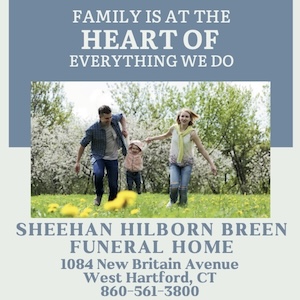
By Thomas Breen
When New Haven native Jeffrey Levinson was a senior in college in 1991, he and his sister scraped together $1,800 to help relocate the Jewish Community Center of Greater New Haven (JCC) from downtown New Haven to 360 Amity Rd. in Woodbridge.
“We believed in the people who were leading that effort to build a new JCC,” said Levinson, who now lives in Milford. “They had this sense that they carried from their parents, and from Legion Avenue, that the New Haven Jewish community had a culture that needed to be celebrated and constantly reinvigorated.”
Twenty-five years later, a fire that rendered the center uninhabitable for at least a year has put the future of the center and the community it serves at a critical juncture. Levinson called on local Jewish leaders to restore the JCC to its status as a true cultural and historical center “that’s alive, and that’s living. Give me a reason to get in the car and drive a half hour to come here.”
Levinson was one of around 30 people to speak at a passionate two-hour town hall held at Congregation Beth El-Keser Israel (BEKI) in Westville on Wednesday night, April 26, on the future location of the JCC, as well as on the services that the building should provide for the 23,000 Jews currently living in the Greater New Haven area.
The event was organized by the Jewish Federation of Greater New Haven, the Jewish Foundation of Greater New Haven, and the JCC of Greater New Haven. Around 300 people attended the town hall, and over 60 people followed along on the Jewish Foundation’s Facebook Live feed.
The impetus for the meeting was the December 2016 fire that devastated much of the Woodbridge JCC’s facilities. While the fire itself was contained primarily to the men’s sauna, the building suffered enough damages to its physical plant and to its HVAC and electrical systems that it has remained closed for the past five months. It is not expected to reopen this year.
In the interim, the JCC has found temporary homes throughout Woodbridge, Orange, and New Haven for its variety of services, from pre-school and after-school programs to basketball and swimming facilities.
The episode has provided the Jewish community with a once-in-a-generation reassessment: Where should it be centered? What form should its institutions take? And, at a time when some Jews have moved to New Haven’s eastern suburbs rather than western suburbs, is Woodbridge the right place for the Jewish Federation and JCC’s main campus — or does a main campus even make sense at all?
“We’re at a crossroads for trying to figure out what to do for our community,” Jewish Federation President Norm Ravski said at the beginning of the town hall. “This meeting was prompted by the fire, but it probably is a discussion that we should have been having all along. We are looking into how to rebuild our community physically, but also at how we deliver services to everybody in ways that the community wants. We want to hear from you about what your passions are; what your desires are; what your fears are. We’re here to listen.”
Over the next two hours, he listened to a lot.
Concerned Jewish citizens from New Haven, Woodbridge, Orange, Cheshire, Branford, North Haven, and elsewhere in the region took to the microphones at either end of the synagogue to voice their opinions before the assembled group of Jewish professionals. The Jewish Federation’s plan is to use the insights shared at the town hall, along with the nearly 800 survey responses from its members, to inform a final proposal on how and where to rebuild the JCC.
As Jewish Federation CEO Judy Alperin Diamondstein put it: “This community isn’t run by its professionals. It runs by a 50-50 partnership between community members, lay leaders, and the professionals you put on the board. We are at our strongest when we are working together.”
Many of the speakers advocated for keeping the JCC at its current location in Woodbridge. This sentiment was particularly strong among an older generation of New Haven Jews, many of whom had been involved in the establishment of the current JCC in the early 1990s.
“Why now move?” asked Stuart Grodd, who chaired the JCC’s relocation committee 35 years ago. “Because a few people are moving? Don’t abandon this building. Don’t abandon the concept of this building. I want to tell you that we sweated for 10 years to raise the money to build [the current JCC]. We begged people to make huge contributions. You think those donors would want to see the building dismantled and moved someplace else?”
Many residents agreed, pushing back against the notion that the JCC might move east to accommodate a nascent Jewish population in Guilford, Branford, and Milford.
“People who choose to move to the shoreline, they have a Y out there,” said Westville resident Fran Grodzinsky. “Let them do their thing. But for the people who stay in Westville, Woodbridge, and Orange: We want to stay where we are.”
But for many, the conversation was less about the specific geographical location of the JCC, and more about the necessity of having a hub for Jewish life than can respond to the changing needs of the different communities it serves.
Abram Ozeck asked for more resources to be allocated towards youth programs like BBYO and Jewish Family Services.
Robert Forbes made his pitch for a closer collaboration with the Jewish Historical Society.
Jay Sokolow offered his support for a JCC that serves as a center for culture and learning, as opposed to just sports and exercise.
Tom Ullmann, along with many others, raised the question of strategic partnerships. If the JCC continues to occupy a 106,000-square-foot building in Woodbridge, why not look towards bringing in a tenant who can help defray the annual costs of running the building?
Diamondstein agreed. After alluding to the JCC’s longstanding struggles with its “financial strength,” which have only been exacerbated by the outflux of members after the December fire, she confirmed that a sustainable future for the JCC would require more partnerships with Jewish and non-Jewish organizations alike.
“That key partner would solve a huge problem for us,” she said. “If we had someone who could take 12- to 15,000-square-feet of our building and generate around $150,000 annually, we would be able to support the needs of our community and keep our current building as the hub. You have spheres of influence. You all know people. It’s time to start talking to people. Tell them we have great parking, we’re close to the Merritt, and we have great facilities they can take advantage of.”
On May 10, select members of the Jewish Federation, Jewish Foundation, and JCC will hear presentations from two task forces that have been assigned to come up with proposals for the future of the JCC. One task force will focus on how best to stay in the current Woodbridge location, one taskforce will look more closely at a “hub-and-spoke” model with one central location that then distributes community-specific services throughout the region. The Jewish Federation will then debate a final proposal the following week during their board meeting.
This article is reprinted with permission of the New Haven Independent, www.newhavenindependent.org, where it first appeared.
CAP: Norm Ravski, president of the Jewish Federation of Greater New Haven, speaks at the Federation-sponsored town hall, as Jewish Federation CEO Judy Alperin Diamondstein (left) and JCC Director Scott Cohen (right) listen intently. Credit: Thomas Breen.








 Southern New England Jewish Ledger
Southern New England Jewish Ledger








